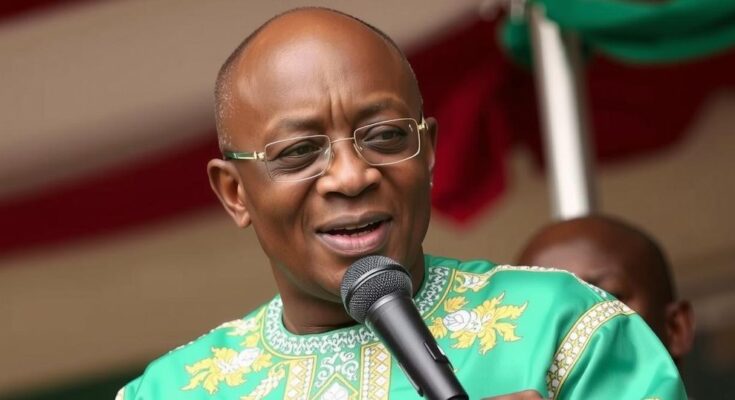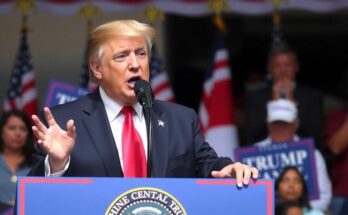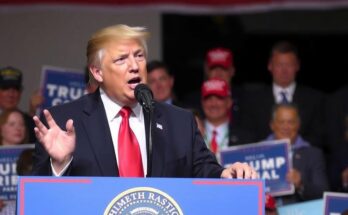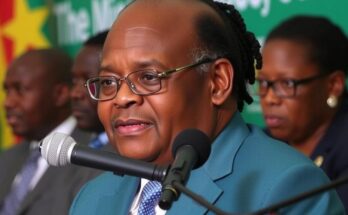John Mahama has officially won Ghana’s presidential election with 56% of the votes, defeating ruling party candidate Mahamudu Bawumia’s 41%. His victory responds to public anger over poor economic management under the outgoing administration. Mahama promises significant reforms to address the challenges facing Ghana’s economy, marking a pivotal moment in the nation’s political history with a 60.9% voter turnout.
In a significant political shift, opposition leader John Mahama has been officially declared the winner of Ghana’s presidential election, securing 56 percent of the votes against ruling party candidate Mahamudu Bawumia, who received 41 percent. The election took place amidst public dissatisfaction with the economic policies and living conditions under the outgoing New Patriotic Party (NPP). Mahama’s victory ends eight years of NPP rule led by President Nana Akufo-Addo, marked by severe economic challenges and international financial assistance.
Mahama articulated his victory as a mandate to address the deep-rooted issues plaguing the nation, reflecting on the previous administration’s shortcomings. He expressed to his supporters, “These eight years have witnessed some of the darkest periods of our governance”. While Bawumia has conceded defeat and acknowledged the electorate’s desire for change, Mahama has vowed to rejuvenate Ghana’s economy and reform policy measures, indicating that the path ahead will be fraught with challenges.
The election, characterized by a turnout of 60.9 percent, revealed a decline in voter participation compared to the previous election, reflecting broader discontent over economic conditions. Mahama’s campaign primarily focused on economic restoration and a commitment to renegotiating Ghana’s agreement with the International Monetary Fund. Historically, the NPP and the National Democratic Congress (NDC) have alternated power since the return to multi-party governance, with this recent election underscoring the critical role economic stability plays in Ghanaian politics.
Mahama, demonstrating resilience after two previous electoral defeats, managed to resonate with citizens seeking a transformative agenda. The unfolding political landscape will likely hinge on the new government’s ability to navigate Ghana’s considerable economic challenges, with the electorate’s patience being tested as they await substantive improvements.
As Ghana stands at this political crossroads, the implications of Mahama’s return to leadership will be closely monitored by both domestic and international stakeholders, eager to see how he addresses the pressing economic discontent and fulfills the aspirations of the Ghanaian populace.
The political landscape in Ghana has been characterized by a two-party system, where the New Patriotic Party (NPP) and the National Democratic Congress (NDC) have alternated power since 1992. Economic management has emerged as a crucial electoral issue, particularly in light of recent financial crises, including a significant debt default and reliance on International Monetary Fund (IMF) assistance. The 2024 electoral process illuminated the public’s growing impatience with high living costs and economic instability, which set the stage for Mahama’s election victory. Historically, Mahama’s previous terms were also marred by economic challenges, yet his messaging focused on change and economic revival resonated with voters. The electoral results indicating a decline in voter turnout signal the engagement and trust issues that the public has toward political processes, underscoring the vital need for effective governance and economic recovery efforts moving forward.
The recent election in Ghana marks a significant transition in leadership, with John Mahama’s victory serving as a direct response to economic dissatisfaction among voters. His pledge to revitalize the economy and address pressing financial challenges reflects a critical juncture for the nation. The outcome indicates a strong desire for change, and Mahama’s administration will be closely watched as it seeks to implement reforms while navigating the complexities of Ghana’s economic landscape. The future of Ghana’s governance and economic health will depend heavily on the effectiveness of Mahama’s policy initiatives in the months ahead.
Original Source: www.france24.com




